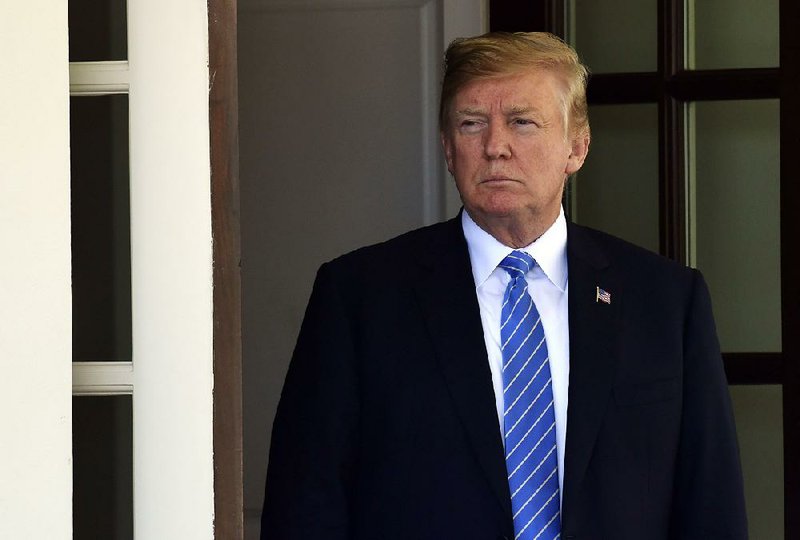WASHINGTON -- President Donald Trump interviewed four potential Supreme Court nominees Monday as the White House keeps up its swift pace in the search for a successor to retiring Justice Anthony Kennedy.
"I had a very, very interesting morning," Trump said as he greeted visiting Dutch Prime Minister Mark Rutte in the Oval Office. He described the candidates he met as "outstanding people" but did not name them.
Trump said he expects to meet with two or three additional candidates and that an announcement is planned for next Monday.
The interviews come on Trump's first day back in Washington after spending the weekend at his golf club in New Jersey. A senior White House official said Trump did not conduct any interviews with potential Supreme Court picks over the weekend.
The White House also announced Monday that spokesman Raj Shah is taking a leave of absence from his position to work full time on overseeing the communications effort associated with the upcoming Supreme Court pick.
Shah, who serves as principal deputy press secretary under Sarah Huckabee Sanders, "will oversee communications, strategy and messaging coordination with Capitol Hill allies," Sanders said in a statement.
The move is part of a broader push by the White House to rapidly confirm a replacement for Kennedy before the court's new term begins in October. Trump has said he plans to announce a nominee July 9.
The White House also announced Monday that the overall confirmation process would be led by White House counsel Donald McGahn, as it was during the process that led to the successful confirmation last year of Justice Neil Gorsuch.
He will be aided by a team of lawyers in the counsel's office and another at the Department of Justice, which will help in vetting the candidates and preparing the nominee for hearings.
The job of working with conservative organizations outside the White House will fall to Justin Clark, director of the Office of Public Liaison, Sanders said.
"Teams of attorneys from the White House Counsel's Office and Department of Justice are working to ensure the president has all the information he needs to choose his nominee," Sanders said in a statement. "The Department of Justice is fully engaged to support the nomination and confirmation efforts."
The temporary reorganization is a reflection of the seriousness with which the White House takes the task of confirming the president's second Supreme Court justice. While Republicans control the Senate, they have only a one-vote margin if they want to succeed in confirming the president's choice.
Others in the White House, including Marc Short, director of legislative affairs, and John F. Kelly, the chief of staff, will also be involved in the process, she said.
Democrats, meanwhile, have begun taking aim at members of Trump's Supreme Court shortlist by name. On Monday, Senate Minority Leader Charles Schumer, D-N.Y., criticized the record of U.S. Appeals Court Judge Amy Coney Barrett of Indiana, who is one of seven judges considered to be front-runners.
In a series of tweets, Schumer argued that Barrett would support overturning the landmark Roe v. Wade abortion-rights decision. He also pointed to Barrett's past statements on the Affordable Care Act and contraception.
"The bottom line: Judge Barrett has given every indication that she will be an activist judge on the court," Schumer said. "If chosen as the nominee, she will be the deciding vote to overturn Roe v. Wade and to strike down preexisting conditions protections in the ACA."
With Trump committed to picking from a list of 25 potential nominees that he compiled with guidance from conservatives, Schumer said any of them would be "virtually certain" to favor overturning Roe v. Wade. They would also be "very likely" to back weakening President Barack Obama's 2010 law that expanded health care coverage to millions of Americans, he said.
Schumer said that while Democrats don't control the Senate -- Republicans have a 51-49 edge -- most senators back abortion rights. In an unusually direct appeal to voters, he said that to block "an ideological nominee," people should "tell your senators" to oppose anyone from Trump's list.
"It will not happen on its own," Schumer wrote in an opinion column in Monday's New York Times. "It requires the public's focus on these issues, and its pressure on the Senate."
Schumer's column appeared a day after Sen. Susan Collins, R-Maine, said she would oppose any nominee she believed would overturn Roe v. Wade. Collins, who appeared on ABC's This Week and CNN's State of the Union, said she would only back a judge who would show respect for settled law such as the Roe decision, which has long been anathema to conservatives.
Senate Majority Leader Mitch McConnell told reporters in Ashland, Ky., on Monday that "it's probably going to be close; I think there will be a big national, campaign rage. But in the end, I'm confident we'll get the judge confirmed."
Information for this article was contributed by John Wagner, Felicia Sonmez, Anne Gearan and Seung Min Kim of The Washington Post; by Catherine Lucey, Ken Thomas, Mark Sherman, Hope Yen and Alan Fram of The Associated Press; and by Michael D. Shear of The New York Times.
A Section on 07/03/2018
